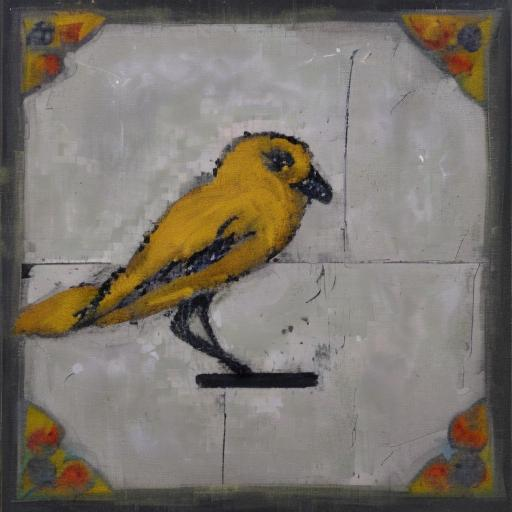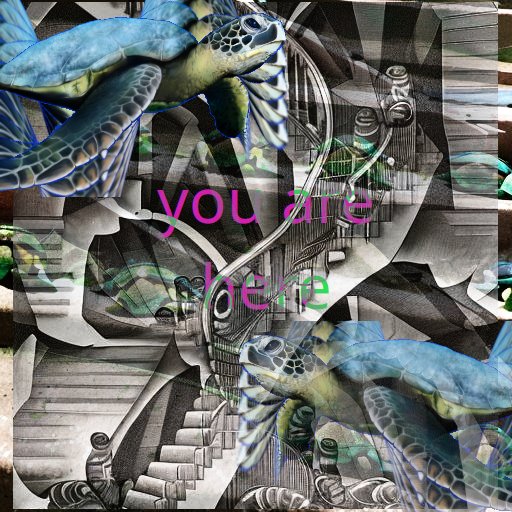
It's intention all the way down: moral urge = a world-building hunger.
Originally posted on substack in June 2023.

one word prompt “Kludge” to nitro diffusion
My use of “worldbuilding” is an attempt to language a notice
that when/what various places and periods label:
morality/spirit/culture/love/gods/Jesus/One/etc, or enlightenment (really)
or whatever,
is the unquestion of intention,
regarding the question of intention
or design and morality.
¿what is the ethical response to morality?I am trying to point out a confounding slippage, at leasat to me, of me and mine, as opposed to a confusion of definitions. Common language interferes with its current and historical usage. I persist in waiting. But is there enough time?
If we use my earlier term of “moral urge” instead of worldbuilding (urge) then the intention/design framework is not needed/assumed as much and so is less confounding overall.
With “worldbuilding” (which I prefer to "moral urge") the unfittedness of intention/design is not so clear, but then “moral urge” has more baggage. In the trade-off, in giving context to “worldbuilding” with new usages, my preferred option is poetry.
Poetry is a making. Good. Neologisms are meaning making. Bad. Neologising usages with an old word like world is even more fraught.
Interesting language however uses old language in a new way.
Anyway, the baggage that the words “moral urge” carries… —is because, confoundedly, (co-confoundedly) while [worldbuilding/moral urge]-in-itself inclines us to design with some intention, the urge itself has none… —except we feel we it should do so, so we grant the urge some design it cannot have. That it cannot even reject.
It does not care. It does not care for it does not care to. The “moral” urge is not moral, it just urges us to moralise, and thus world build. This is confounding.
So then, because of this urge involuting itself with/in our notice/intention, as it has none, the likelihood is large that we will assume that it does, and that it is intention all the way down. Just like those proverbial turtles.

turtles descending a staircase © 2023 meika loofs samorzewski
An example of this involution in using "moral" is the assumption common in theologies that a lack of the mere belief in god/karma results in the absence of any morality at all. Society would collapse, the world would disappear, if not reality.
This assumption occurs at the behest of the world-building urge combined with our sensibilities regarding consistency (one might argue they are the same thing). Here the assumption both world-builds and makes such a kludge consistent with itself, the world is safely knitted into reality, at least from the perspective of the world as it is worlded.
Considering these concepts of god/karma are very recent developments and post-date the moral world that Homo sp. have created over thousands of millenia, this is a very rich and over-arching claim. But very common.
This over-arching claim is also the result of the urge. The urge cares not for consistency nor practical feasibility. Survival has other priorities, like, give it a go…

Photo by Markus Spiske on Unsplash
You might learn something. You might survive.
While it would be likely to overstate the claim that intentions ("beliefs")are always outcomes, in this case it is true. For us living in the world of our ancestors, intentions by definition are seen as the origin of things we do/design/plan etc, so we are doubly confounded by it when intentions as outcomes is pointed at as a possibility, however briefly. Morailty is an outcome not an informing principle. (We will ask "an outcome of what?" later.)
We assumed intentions precede all our things in the world without much thought, so querying it can cause deep consternation. Our sensibilities as well as our concepts are reframed and un-fused. Of course this is consistent with their confounded birth. It hurts.

Photo by Karsten Winegeart on Unsplash
Hunger is the best sauce, but hunger is no recipe, hunger has no plan.
Moral urge = a world-building hunger.
The baby is crying, what are you going to do?
The mistaken assumption that “morality” or … whatever, is the result of design/intention/plan is a rationalization. To reverse this mental vector, even if it is at odds with what possibly “really” happened, is not easy to do with clear langauge, with the language we have inherited, by default. And we call that intention… —and it is designed?
I say 'possibly' because errors are possible. I say “really” because language.
Outcomes in recent epochs of the worldbuilding-moral urge using very recent social constructions like god/karma, are indeed based on our animal ideas of intention, the design in our day to day lives.
We even think language is recursive because we can plan the stages in making a complex tool of many sub-parts each requiring a separate manufacturing process. While it is easy to say language and tool use co-evolved, I bet this co-evolution is based on the need to survive, and not some plan for consistency between morality and the world.
The outcomes blind us to our success.
Logic is a hindsight. Logic explains nothing, certainly not our proclivity to use logic to explain too much.
We are confused, not because of chaos, but because we confound our beginnings with our ends. This happens right-away mind.
Our intentions cause us to blame when credit is due. Original sin predates a conscience. Looking back I can see clearly the now.
A confounding mess is not necessarily a systemic incompleteness or aporia, the gap here is potentially avoidable, unfortunately, what makes it avoidable, also makes it repeatable. Such are confounding things in their 'true nature'. The repeatability means they can iterate around strange attractors, which every decision made makes, or intended, intends, all that will subtend a new cycle.
A culture when it seeks consistency, attempts to become diagram of a wave of such cycles, as if the diagram can control itself. This can be avoided, but requires an intention to do so. Of course intentions per se ennamoured of its self is unlikely to avoid this confounding confusion, even as it gropes towards a plan.
You may have to give up control to win the day.

Photo by Alexander Schimmeck on Unsplash
